Hanakotoba

This article needs additional citations for verification. (January 2021) |
Hanakotoba (花言葉) is the Japanese form of the language of flowers. The language was meant to convey emotion and communicate directly to the recipient or viewer without needing the use of words.
Flowers and their meanings
[edit]| Japanese name | Romaji | English | Meaning | Image |
|---|---|---|---|---|
| アマリリス | Amaririsu | Amaryllis | Shy |  |
| アネモネ | Anemone | Anemone (white) | Sincere | 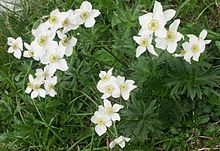 |
| アムブロシアー | Amuburoshiā | Ambrosia | Pious |  |
| 紫苑 | Shion | Aster tataricus | Remembrance |  |
| 躑躅 | Tsutsuji | Azalea | Patient, modest |  |
| ブルーベル | Burūberu | Bluebell | Grateful | 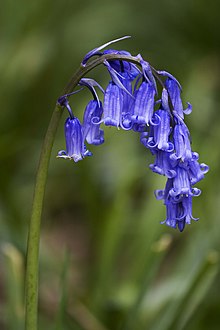 |
| サボテン | Saboten | Cactus | Lust, sex | 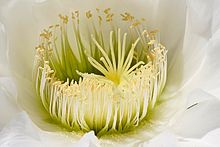 |
| 赤 椿 | Aka Tsubaki | Camellia (red) | In love, perishing with grace | 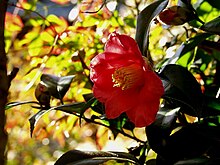 |
| 黄色い椿 | Kiiroi Tsubaki | Camellia (yellow) | Longing |  |
| 白椿 | Shiro Tsubaki | Camellia (white) | Waiting |  |
| 黒百合 | Kuroyuri | Fritillaria camschatcensis | Love, curse |  |
| カーネーション | Kānēshon | Carnation | Fascination, distinction, love |  |
| 桜 | Sakura | Cherry blossom | Kind, gentle, transience of life |  |
| 黄菊 | Kigiku | Chrysanthemum (yellow) | Imperial |  |
| 白菊 | Shiragiku | Chrysanthemum (white) | Truth |  |
| (四つ葉の) クローバー | (Yotsuba no) kurōbā | Four-leaf clover | Lucky | 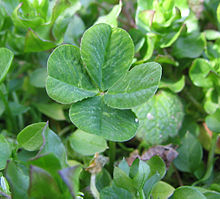 |
| 水仙 | Suisen | Daffodil | Respect |  |
| 天竺牡丹 | Tenjikubotan | Dahlia | Good taste |  |
| 雛菊 | Hinagiku | Daisy | Faith | 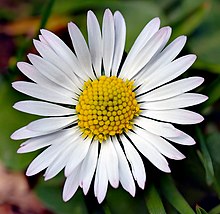 |
| エーデルワイス | Ēderuwaisu | Edelweiss | Courage, power |  |
| エリカ | Erika | Erica | Solitude | 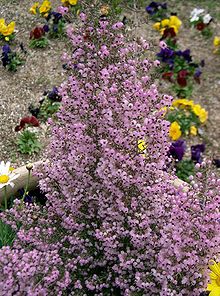 |
| 勿忘草 | Wasurenagusa | Forget-me-not | True love | 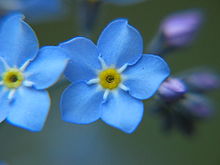 |
| フリージア | Furiijia | Freesia | Childish, immature |  |
| 梔子 | Kuchinashi | Gardenia | Secret love |  |
| 鷺草 | Sagisō | Habenaria radiata | Purity, delicateness, "I'll be thinking of you even in my dreams"[1] | 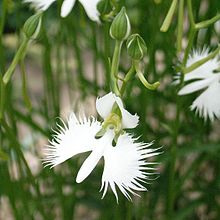 |
| ハイビースカス | Haibiisukasu | Hibiscus | Gentle | 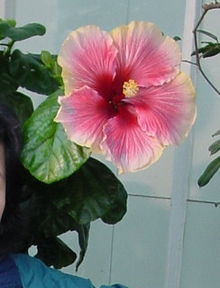 |
| 忍冬 | Suikazura | Honeysuckle | Generous |  |
| 紫陽花 | Ajisai | Hydrangea | Pride |  |
| 菖蒲, アイリス | Ayame, Airisu | Iris | Good news, glad tidings, loyalty |  |
| 茉莉花/素馨, ジャスミン | Matsurika/Sokei, Jasumin | Arabian jasmine/Spanish jasmine, Jasmine | Friendly, graceful |  |
| ラベンダー | Rabendā | Lavender | Faithful | 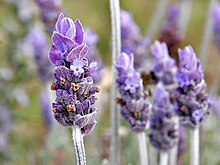 |
| 白百合 | Shirayuri | Lily (white) | Purity, chastity |  |
| アルストロメリア | Arusutoromeria | Lily of the Incas (Alstroemeria) | Such strong connection that language is limited when trying to explain it |  |
| 小百合 | Sayuri | Lily (orange) | Hatred, revenge |  |
| 鈴蘭/百合 | Suzuran/Yuri | Lily of the Valley/Spider lily | Sweet | 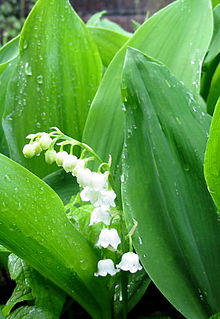 |
| 鬼百合 | Oniyuri | Tiger lily | Wealth |  |
| 彼岸花/曼珠沙華 | Higanbana/Manjushage | Red spider lily | Never to meet again, lost memory, abandonment |  |
| 向日葵 | Himawari | Sunflower | Respect, passionate love, radiance |  |
| 蓮華 | Renge | Lotus | Far from the one he loves, purity, chastity |  |
| 木蓮, マグノリア | Mokuren, Magunoria | Magnolia | Natural |  |
| 宿り木/ホーリー | Yadorigi/Hōrii | Mistletoe/Holly | Looking for love |  |
| 朝顔 | Asagao | Morning glory | Willful promises |  |
| 水仙 | Suisen | Narcissus | Self-esteem |  |
| パンジー | Panjii | Pansy | Thoughtful, caring | 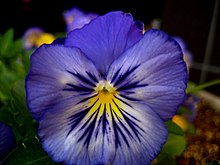 |
| 牡丹 | Botan | Peony | Bravery |  |
| 雛芥子 | Hinageshi | Poppy (red) | Fun-loving |  |
| 芥子(白) | Keshi(shiro) | Poppy (white) | Rejoice |  |
| 芥子(黄) | Keshi(ki) | Poppy (yellow) | Success |  |
| 桜草 | Sakurasō | Primrose | Desperate | 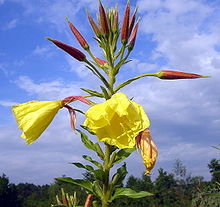 |
| 紅薔薇 | Benibara | Rose (red) | Love, in love |  |
| 薔薇 | Bara | Rose (white) | Innocence, silence, devotion |  |
| 黄色薔薇 | Kiiroibara | Rose (yellow) | Jealousy |  |
| 桃色バラ | Momoirobara | Rose (pink) | Trust, happiness, confidence |  |
| スイートピー | Suiitopii | Sweet pea | Goodbye |  |
| チューリップ | Chūrippu | Tulip (red) | Fame, charity, trust |  |
| チューリップ | Chūrippu | Tulip (yellow) | One-sided love |  |
| 美女桜 | Bijozakura | Verbena | Cooperative | 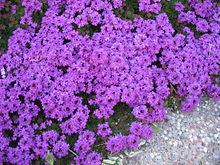 |
| 菫 | Sumire | Violet | Honesty |  |
| 百日草 | Hyakunichisou | Zinnia | Loyalty |  |
See also
[edit]References
[edit]- ^ "サギソウの花言葉". 花言葉-由来. Retrieved 14 August 2020.
- Gatti, Sabrina (2016). Lieve ed eterna come un fiore. La florigrafia. Analisi storico-sociologica di una forma di comunicazione non verbale (in Italian). Naples: Eracle Edizioni. ISBN 978-8867431632.